|

On the move. Opossum, Didelphis marsupialis.
(*photo credit)
January 1, 2011
National Resolution: Exit Afghanistan
The military actions
in Afghanistan all contribute to the great distraction of seeking security in
wrong places. National security? Hardly, if the deaths of innocent
civilians in that war-torn country are blamed on our fighting machine, and
result in a form of insecurity for those suffering from war.
Nation-building? The Afghans have never known nationhood in thousands of
years of tribal existence, and America hardly needs to be others' history
teachers through use of guns. National economy? This approaches a true
yet mostly unspoken reason for military action. We may need to be leaders for a
more just world, but can't this be done at lower costs? Why a
one-hundred-billion-dollar-a-year military? Why hundreds of dead men and
women along with countless wounded?
Dictated by the
military/industrial complex? Yes, this phrase, first coined by President
Eisenhower a half century ago, is something that is operative right now. This
is the complex reason, and few in Congress want to change the status quo when
perks to their districts make it virtually impossible to vote against war
authorizations. The economy directs and the war industry chieftains dictate
that we fight. How else could they stay productive and profitable? If we were
playing games this would sound humorous, but with actual essential needs in a
world (Haiti) without proper housing) calling, a practical and just change
becomes an urgent challenge.
Let us get out at the end of this year as some experts (e.g., William Polk of
the W.P. Carey Foundation) say must be considered -- and an anti-war movement
is starting to stir. The European and NATO allies are losing patience as well,
as one by one they seek to pull out their token contingents and abandon the
American volunteers to slug it out and take casualties. We have got to be
people of resolve in a world of insecurities. A family that does not have the
food to feed its children tomorrow is quite a bit more "insecure" than a nation
at war because the rugged terrain of Afghanistan and neighboring Pakistan harbor
remnants of terrorist elements that created 9-11. We can guard our borders and
airports with far fewer resources than are used to pay outrageous rates to keep
supplies moving into lawless Afghanistan -- or hope for a more responsible
government to end the money-greasing corruption.
Resolve:
Set a withdrawal date: December 31, 2011. Now the people of Kabul and
beyond know that each clinic and school is completely theirs this time next
year. Now is the time for beginning an orderly withdrawal at the least cost of
casualties. We are not going to democratize a tribal "nation" in this year;
such is beyond the original mandate and beyond our limited American treasury.
We could take some of the saved money and put our people to work rebuilding our
infrastructure and launching a renewable energy economy. We could also bring
true security to a hungry world.
Prayer:
Lord, help us become a just people with true resolve.

Breathtaking overlook north of Fort Nelson, British Columbia.
(*photo credit)
January 2, 2011
Epiphany: Tell It Like It Is
Epiphany
comes from the Greek, meaning an appearance or a manifestation. At this time of
year, it is part of the Christmas season and refers to the manifestation of the
Christ or Messiah to the rest of the world beyond the place of birth. It is the
culmination of the Christmas season and the Incarnation event.
In some churches of the east the
event is combined with that of the baptism of Jesus and the visit of the Magi.
Epiphany is a global festive celebration of the coming of Christ. Each year we
read the same liturgical selections and that makes new themes difficult.
However, new problems and needs arise -- and thus so for this year 2011. This
is a time to be honest and manifest the thoughts and hesitancies of what ought
to be done or said. In other words our own manifestations must be all the more
transparent. This year we need to be more open in many ways.
Financial
openness: Global, national, regional, local and domestic financial concerns
make this a time of being truly honest abut priorities with limited financial
resources. Thus a new economics is truly in order. Some actually hide their
rather desperate condition although their situation ought to be known as grounds
for a new world economic order of sharing resources. More openness will mean
new ways of sharing resources.
Ecological
signs: Some would like to deny the conditions of our world of the
privileged consuming vast quantities of physical resources, when others are in
need of food, clean water, and proper lodging. Frankly many environmental
emissions are growing even in these enlightened times, and a wave of denial on
the part of many is retarding meaningful efforts to curb human-made disasters.
Global warming is here, and we are partly to blame.
Personal
extravagance: Closely related to the above two is the issue of people
enjoying materials far beyond their means. It is a people driving recklessly to
a cliff and enjoying the few minutes left in utter abandon. We need to come to
terms with our physical and mental health as well as with our tastes and
demands, some of which go well beyond reason. An epiphany may occur with a
physical exam or with an analysis of resource use, or a closer look at
appliances or vehicles used. We create the personal epiphanies that could lead
to disaster on the personal or community level.
Spiritual
demands: We are a collective people on the road and that means not
excluding others from our material privileges, but rather understanding the
needs of people everywhere and fighting to obtain a just redistribution of
resources so all may live in peace. What Epiphany calls us is not to ASK the
rich to part with their abundance, but rather to DEMAND it.
Prayer:
Lord, help us to be transparent in a most pronounced manner so that the world
may be a better place in which to live. Help us to prioritize our
individual and collective needs so that 2011 will be a more meaningful year for
all.

Choppy waters of Norway Lake, Kenton, MI.
(*photo credit)
January 3, 2011 Disparity
in Wealth: Number One Global Insecurity
During
the heart of the financial meltdown in 2008 and 2009, the disparity of wealth,
which had been growing in this country since the 1970s, accelerated. The
American rich gained over eight percent in their cumulative wealth while many of
the middle and lower class retreated. Today the top one percent of Americans
have 1.3 trillion dollars in wealth, and the bottom ten percent are unemployed
and scratching to stay alive. Few challenge this ability of the wealthy to gain
and regard the gulf between rich and poor as a problem and threat. How else
will my unemployed loved one get lucky and possibly become a billionaire? "If
anything, let's keep the status quo," they say, "lest the battles for possible
wealth elude us." They fail to see that expanding wealth is a threat to the
democratic processes.
First,
the bald fact is that disparity of wealth is growing at a very rapid rate. Bill
Gates, amid his many well-publicized giveaways, gained three billion dollars
last year. If the world is helpless as the rich become richer, people will tend
to do either of two things: they will cater to the rich so that some crumbs
that fall from the table will be picked up (perpetrate the American Dream), or
they will rebel and try to change the system in the very style that Thomas
Jefferson said ought to be done if a system is not working for the people.
Jefferson was not a perfect person but he understood democratic process far
better than tea-party folks.
Second,
we must become sensible about the problems of this world. In many places,
including parts of this country, the issue is not too much government but a lack
of governmental controls over the wealthy. Such diffidence leads to overlooking
the needs of people for jobs, health care and basic essentials of life. When
the rest of the world has immense hunger and lack of access to basic resources,
government is needed to help redistribute essential resources as part of global
health and security. Wealth is meant to be distributed, not retained as a tool
of power -- and telling this is a matter of bringing "Good News."
Redistribution
will never be achieved voluntarily by the holders, for their financial power
tends to corrupt them and lessen their total generosity -- that includes
surrender of political/economic power. A fair and just process can only be
achieved through a process that is anathema this year -- more taxes especially
on the wealthy, lest this world move to revolution or to right-wing governments
as occurred with the rise of Nazism during the Great Depression. Preserving
democracy occurs through fair taxation. The resolve to equalize wealth would be
the most notable way of keeping the political system intact and bringing about
security and reduced terrorism in the world around us. But are we willing as a
threatened democracy to take on the rich?
Prayer:
Lord, help us to exercise our democratic citizenship and to protect the
vulnerable and confront the powerful -- and to do this with equanimity and
positive resolve.

Scrambled egg and broccoli casserole.
(*photo credit)
January 4, 2011 A
Challenge: 365 Different Breakfasts
For
the past two years I have assembled lists of soups and salads; I consumed 365
soups in 2009 and the same number of salads in 2010 (see
Special Issues).
The purpose was to demonstrate that one can live simply and yet have a variety
of nutritious foods at very low cost in monetary and personal cooking time.
Soups are generally in the evening and salads at lunches, and so people have
asked -- can you create that number of breakfast main dishes? The challenge is
all the greater because we are folks of habit, and the beginning repast is
generally the one that we repeat day-after-day.
However,
on second thought, inventive people attempt to vary even the first meal somewhat
over time; this adds additional flavor or variety to what could be mind-numbing
daily routine. When we have visitors or when on the road ourselves, breakfast
variety comes calling. But then why not set creative juices to work? New
breakfasts are as challenging as new salad creations and soup concoctions. Some
principles that may give different breakfasts include:
* Do not rely on variation
in meat as the main protein source. Rather consider eggs and beans or other
legumes. For those of us who seek to limit our eggs to two a week, this reduces
the options and still allows for use of beans or other materials as a
substitute. However, varying the type of beans ought not to constitute a new
breakfast.
*
Do not regard a variety of cold cereal types or brands as a major mark of
variation either. Hot cereal variations as to type and added ingredients could
be a fruitful source of difference. We do vary the types of fruit or nuts
introduced to the cereal types in order to reflect seasonal local availability.
Liquids used in the cereals are an added ingredient.
*
Limit but do not exclude meat use. For those of us who do not purchase meat,
this becomes a limiting barrier to success.
*
Though some heavy carbohydrate-based breakfasts are admissible, these should be
limited to special occasions and never eaten more than once or twice a week.
All things considered,
breakfasts are still a challenge. What if there were restaurants that have a
different breakfast every day? Most likely they would soon admit that this is
not fun and is not profitable either. The quest for variety is at stake here.
The hope is that others will accept the challenge to think about different meals
and thus start the day on a more creative note. Develop a new breakfast and
discover your own creativity.
Prayer:
Lord, let us start a new day, one given to us for the betterment of ourselves,
our neighbors and our world. Help us to constantly start in a more concrete,
food-based and spiritual way.

Tennessee wind farm.
(*photo credit)
January 5, 2011 Renewable
Energy Is Growing Remarkably
While
supporters of traditional energy sources (oil, coal and nuclear) are making
efforts to keep the current importance of these sources favored by tax credits,
perks and relaxed regulations, the use of renewable energy sources is expanding
rapidly. Some regard 2010 as the tipping point when renewables came into their
own ("Renewables 2010 Global Status Report," <RenewableEnergy World.com>,
September 27, 2010). This renewable trend has gone beyond European countries
like wind-conscious Denmark, has penetrated Asia with China moving into the
renewable arena, and is catching on fitfully in the United States. In 2009
renewables (hydro, geothermal, wind, solar and biofuels) accounted for
one-quarter of the global power capacity and 18% of the global electricity
supply. In fact, this past year was the second in a row when more money was
invested in new renewable power capacity than in fossil fuel capacity. Now over
half of added capacity is from renewable sources both here and abroad.
Advantages
of the renewable energy trend include: lessening of environmental degradation
through air pollutants; avoidance of the higher and longer-term construction
costs of nuclear power facilities; encouragement of improvement in solar and
wind electricity generating technologies; better worker safety in contrast to
coal and uranium extraction; additional encouragement from general acceptance
and preference for renewables by a broad span of the political and social
communities; transportation energy savings; and improved security when turning
away from using nuclear and fossil fuel resources.
Wind is currently the most
promising renewable source. Most folks are familiar with the growing potential
for wind on the Great Plains, but wind-rich areas are present and plentiful
along our heavily populated eastern American seashore from Boston to Florida.
When considering only wind energy from turbines located in waters thirty meters
(about one hundred feet) deep and three to twenty-four miles off shore, an
Oceana report estimated that 127 gigawatts of power could be furnished.
This is sufficient for the total electricity demands of North Carolina,
Delaware, and Massachusetts along with 92% of New Jersey's, 83% of Virginia's,
and 64% of South Carolina's electricity needs. Totally, over half of the
electricity demand of that populated east coast could be supplied by wind alone
when fully utilized.
Besides
wind, a mix of renewables could fill up the ongoing demands of an electricity
hungry world. Proper low-head hydro facilities are inviting, as are geothermal
possibilities. Solar energy is awaiting development on a decentralized basis
when home roofs and windows can be equipped with photovoltaic coatings that
influence electric demands of the individual locations. With proper incentives
and tax breaks these sources can shine.
Prayer:
Lord, give us the courage to launch into a less polluting world in which
renewable energy will have a major role.
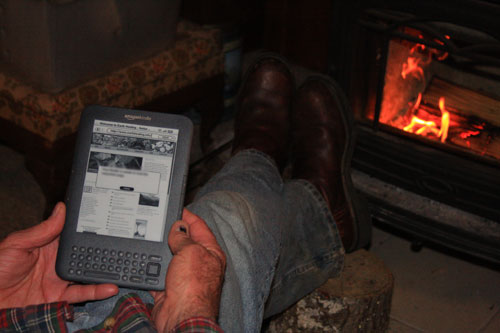
Reading the Earth Healing website with the Kindle e-book reader's web browser.
(*photo credit)
January 6, 2011 The Pros
and Cons of Electronic Books
Researchers
wonder at the start of 2011 how to divide communications efforts between hard
copy and electronic output. Young people are more likely to do their reading
with new electronic readers than are older folks. They have not had the number
of years of the safe feeling of books on shelves and notations made in margins
-- though the glory of either is somewhat exaggerated. Libraries of thousands
and millions mean little if the books go unused. I recently had a bequest of
some nature books from a deceased parishioner who knew I shared his delight in
wildlife. The bequest was graciously received but it struck me that many will
go unused if inaccessible where needed.
Electronic
books are cheaper. Book-starved developing regions of the world are hard
to reach from lands overstocked with hard copies -- and so they were turning to
electronics just as they leapfrogged over land-based phones to cell phones.
Many residents of central Africa and Latin America are finding that choosing
electronic books means going from school and domestic libraries of dozens of
expensive printed books to thousands and millions of electronic books now
available on cell phones or the Internet.
Electronic books are
easier to produce. My own quandary extends beyond distribution to the
effort it takes to produce printed materials in contrast to electronic copies.
Changes that need to be made can occur with less effort through electronic
adjustments than through changing the presses. Furthermore, books are
easier to store in disk fashion, as a library can be carried around dangled
from one's little finger. Try porting a voluminous library about with you from
place to place. In addition, the electronic book is often easier to access
for it can be word- searched or flipped through so much more quickly than can
its printed cousin. Getting to know its very existence, especially if not a
popular subject or title, involves searches that permit accessibility by seekers
of certain subjects.
Electronic
books are not only in the future but also THE future. However, drawbacks
remain. Books have more permanence and are not destroyed by a nearby
lightning strike, though libraries burn down. Printed communication is not
dependent on new technologies and delivery systems, making older ones so
outdated that they become useless, like floppy discs containing valuable
information. Printed matter is easier on the eyes of some of us who
suffer from eye trouble. Printed matter is a gift worth transferring from one
to another. Printed matter allows for longer periods of relaxation and
reflection for those trained and steeped in certain forms of meditative
reading and photographic reproduction (our photographic book, Mountain
Moments, in contrast with electronically-reproduced photos with each Daily
Reflection). Certainly printed matter has some advantages.
Prayer:
Lord, help us to receive the Word in a variety of ways and with open hearts and
minds so that more benefit.

Nepentes ventricosa hybrid, potted. Native of the Philippines.
January 7, 2011
The Benefits of Potted or Houseplants
Why
talk about potted plants when the world is in such turmoil? This was written on
a day the BBC was announcing that deep austerity measures in the United Kingdom
include curbing maintenance of office potted plants. Why the fuss over indoor
plants? Let them be received as gifts and encourage the room user to water the
plants once a week. Big deal! Just remember to water on a regular basis. I
have a Christmas cactus that has an annual red bloom, some parsley I bring in at
frost, frost, an inherited water plant that needs cropping at times, and an
aloe vera for cuts and burns. Others may add ferns, flowers, and herbs.
Domestic or office plants have
benefits worth enumerating:
* Care for creation
-- Help fulfill the need for everyone to care for the environment; even the
less able can tend to plants in some meaningful fashion through watering them;
* Interior atmosphere
-- Enliven the interior of the house or office in winter with a form of greenery
and life;
* Natural air
purification -- Freshen the space in a natural manner in a rather
inexpensive way;
* Environmental
commitment -- Plants show the occupant to be a nature-friendly person who
affirms life in more than mere words;
* Practical products
-- Plants furnish a source of beneficial products for the resident that include
fresh seasonings and medicinal remedies right at hand;
*
Opportunities to touch soil -- Plants have the potential to be repotted
or subdivided over time and thus give a chance to get one's hands dirty;
*
Meaningful gifts -- Use the sub-divided potted plant as an ideal gift to
others who need to enhance their own living space;
*
Gardening skills -- Consider the effects of growing on a small scale as a
launching pad for braving the raising of more plants outside when the growing
season allows;
*
Personal responsibility -- Regard growing houseplants as beyond being an
adult or womanly task and include kids and males;
*
Conversation piece -- Discover linkages with people who also value
houseplants as part of their everyday experience; and
*
Potential prizes -- Remember to be proud of what is grown. My mother
won many ribbons for her healthy houseplants, which she barely mothered but
always watered.
Prayer:
Teach us, Lord, to value the floral life that is near and dear to us through
more gentle beckoning and extended care.

A coal plant in Muhlenberg Co., KY, near Paradise.
(*photo credit)
January 8, 2011
Hypocrisy: Coal Use and Opposition
If
you really oppose using coal as a fuel, please turn off the lights and shut down
this computer. Too many of us utilize coal to furnish the electricity we use
everyday. In our non-nuclear states we do have reason enough to justify
opposing nuclear power as a source of electricity. But coal? The trains come
by outside my window: about six 110-car trains loaded with seventy-five tons of
coal each weekly to the best of my calculations.
A qualified opposition
to fossil fuel is possible, even while benefits accrue from coal use. I have
always opposed destructive extraction of coal from Appalachia and have spoken,
up for the need to reclaim damaged minelands. This situation is more acute in
our fragile Appalachian region than in more easily reclaimable flat plains
further west. Accepting coal as an intermediate fuel before the transition to
the renewable fuel economy means depending on it for forty percent of our
electricity for our own lifetimes and beyond. Granted, renewable energy sources
now equal nuclear power in this country in their contribution to national
electricity demands. In all but an idealistic scenario renewables will take
time to complete the replacement.
Hypocrisy
can occur when we knock something we need while accepting coal-derived
benefits. I find some environmental critics to be in the company of Thomas
Jefferson, who in "The Virginia Papers" slammed slavery and rightly so;
however, at the same time he not only held slaves but even sold off individual
slaves to embellish his home "Monticello." We ought to learn from the
imperfections of the past. We cannot benefit from coal while totally knocking
it, and heavily criticizing it without proper qualifications becomes a weakness
that the fossil fuel industry is quick to show. When living in a solar economy
(at the ASPI solarized Nature Center in the last century, I was justified in
criticizing coal policy; today, my current office has its electricity from
coal-burning powerplants.
An
equal playing field for renewable energy is a justified demand. We seek
more rapid transitions and call for and use fuel efficiency measures. Today,
some 500 billion dollars a year is spent on tax breaks and subsidies to the
fossil fuel industry, while only one-tenth that amount goes for renewable energy
sources that have been hit quite hard by the Great Recession. An even playing
field would allow the rapid advance that is occurring in wind and solar to
proceed at an even more accelerated rate. We are moving away from coal but not
very fast. Increasing that rate is a proper goal and attempting to reduce the
bad effects of coal extraction should be a simultaneous demand. Qualifying our
opposition to excesses of coal use reduces popular appeal -- but that is only
fair for coal users.
Prayer:
Lord, help us to be moderate in all things, not being silenced and yet not being
overly critical in non-realistic ways.

A rural Kentucky stream. Anderson Co., KY.
(*photo credit)
January 9, 2011
Baptism: Called by the Exclusive ONE ...
This is my son, the beloved;
my favour rests on him. (Matt. 3:17)
There
is only one God; no other gods are tolerated. The Hebrew Scriptures speak loud
and clear. God demands exclusive worship and attention -- and with this solemn
demand God directs the Israelite community to prepare the path -- to a common
global worship. The commons was divided at Babel into islands of groups
worshiping material things and false gods -- and this division still exists. To
reclaim the commons of singular attention to God is the initial call to a chosen
people on whom had been bestowed a solemn vocation, as these people work
together to bring about global unity. Rather than let the Israelite community
be a static faithful remnant, the message went forward -- and that was what the
Baptism of Jesus was all about. Amid great solemnity a Messianic journey was
launched at the Jordan River to reclaim a world and, a fortiori, the
commons.
The
Babel tower twists the Divine Command and this twisted image still hangs over
us; this man-made structure overshadows a divided world grasping for privileges
that are of human origin, causing people to strive for exclusive privilege built
on cultural similitude, competing islands of self-interest with an inclusivity
of gods of every type. Jews and later Christians and then Muslims have often
misinterpreted the message; they have thought of themselves as exclusively
chosen or saved as though in a static way. These mistaken folks may place
inclusivity in forms of idol-fashioning that help them retain their privileges;
they dare not declare that they really worship mini-Capitalistic gods. The
materialist "exclusivity" is the justification of vast possessions by
billionaires although while they live in utter luxury many of the poor are still
starving; the materialist "inclusivity" is to include tolerance of all forms of
hidden and public idols.
The sound of the roaring
Jordan below Mount Hermon still rings in my ears, a musical prelude to the event
of Baptism, that I had the privilege to hear in April, 1992. Jesus is a
covenant of the people, the light of the nations, to open the eyes of the blind,
to bring out prisoners from confinement, and from the dungeon, those who live in
darkness (Isaiah 42:6-7). The process of reclamation needs one empowered to
act and clothed in divinity. Thus the solemn task ahead of us is a task
launched long ago as narrated in the account in the third chapter of Matthew.
The process requires a divine leader going ahead of us, a light for us all to
follow. Such a leader at a singular starting moment is exclusive, for it is
from God; it is Godly; it is a divine Messiah's mission The divine exclusive
ONE is Emmanuel among us.
Prayer:
Lord help us to reaffirm to our Jewish brothers and sisters that their mission
is still operative, and that we as part of the human family affirm it to be to
spread the Good News that God alone is to be served and worshiped. God is
exclusive; we are missioned to act in inclusive
ways to bring this about.
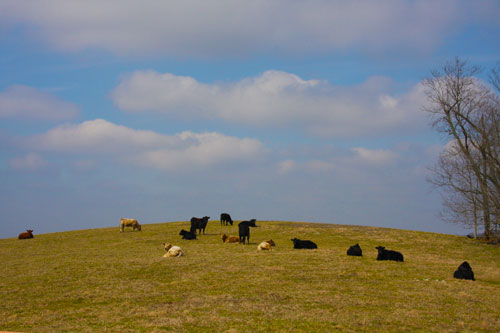
Gathering of the herd. Cows in Washington Co., KY.
(*photo credit)
January 10, 2011
... To
Reclaim the Commons by the Inclusive ALL
In
truth, I see that God shows no partiality. (Acts 10:34)
The
commons is the gifts given to ALL peoples, not to a privileged few. In turn,
all ought to participate in the fruits of these gifts and help preserve them for
others -- and in doing so become acceptable to God. All participants from every
nation who act uprightly and fear God (Acts 10:35) are part of a cooperative
whole, a people of God invited to take part in the commonality of cooperative
effort. Christ follows the prophets of the Old Testament who are called by God;
now we follow Christ the leader and Light of the World. His coming was urgently
desired; our following has an urgent aspect as well. John the Baptist,
hesitant at such an awesome task of baptizing Jesus, encourages us to present
Christ to the troubled world. Our performance moves from exclusive calling to
inclusive participation with all people of good will. God invites us to a
common enterprise in which we have unique gifts to share -- not meant for
privileged retention.
Peter,
as human leader, comes to realize that the Almighty demands a service not a
special privilege. God's favor extends to us, but we, like Jesus, accept it by
humbly going down to baptism. Our gift is not merited but freely given; we now
must freely share it as a humble people. Peter says, "God can evidently grant
even the pagans the repentance that leads to life" (Acts 11:18). Theirs is the
universal response of all people of good will who, on hearing the Good News,
seek to glorify God. Baptism changes our lives; it removes the tarnished
condition in which we go to the water; as we emerge from our Jordan, we find
new life to color our entire journey of faith. Baptism is our launching pad,
the most important moment between our birth and our passing from this life. Our
task ahead includes entering our work with our unique gifts and within a
community where these gifts are self-reinforcing.
"Inclusiveness"
in a proper meaning involves the universalization of the participation process
-- not the exclusivity of a Jewish people as recipients and retainers of
privilege, but the inclusivity of their goal of adoring one God, now worshiped
by more than half the world's population (Christians Moslems, and Baha'is). It
includes a message of unity to Hindus, Sikhs and all who fear God.
"Exclusivity" is not an individual human, racial, or national privilege but the
direction of our worshipping attention to God, YHWH, and God alone. The message
of our inclusive cooperation in salvation goes out to the ends of the world --
and that is an ongoing call to Jews and now to Christians and others. The
proper use of the commons (not as a multitude of material gods but as our joint
common essential means to salvation) allows us inclusively to worship our
exclusive God, Creator of all.
Prayer:
Lord, help us to see the divine redemptive process as a total gift from your
exclusive Majesty; teach us to see our unique gifts as worthy of being freely
shared, not selfishly retained for privileged
individual use.

A wall of ice along the Kentucky River.
(*photo credit)
January 11, 2011
Attention Compulsive Meeting-Goers
Quite
often in winter, meetings have to be canceled. Some meetings are utterly
necessary; some gatherings are routine and habitual; a few meetings are
wasteful of time and energy. The first class of meetings is honored and needs
rescheduling; the second group can be cut and streamlined; and the third ought
to be avoided and suppressed because the existence of these meetings sets a
priority to unimportant issues. I define weekly church-going in the first
category, though others place it in the second, and the highly secularized would
relegate it to the third. Some people live by meetings, the social instruments
that define their lives and even work. Others see many meetings as burdens
requiring warm bodies to make the organizers feel good.
Discerning
the importance of meetings is a critical issue for all who find travel
increasingly difficult, energy levels declining, transportation costs cutting
into budgets, ability to pay attention and to act civilly increasingly
problematic, and other competing needs crowding into personal time and
resources. It takes effort to go to and give full attention to meetings; they
cut into full schedules. Consider the following:
* Do the time and resources
justify going to this meeting?
* Am I simply following the
pressure springing from compulsive meeting-goers who want control of people and
events?
*
Can I delegate others to take my place instead of all going?
* Is the burden so great
that attending depresses me?
*
Are the meetings properly prepared and enticing in themselves or are they a
burden on the meeting-goer?
* What will be the possible
outcome of the meeting and are these meetings generally successful?
* Can the results be
achieved in another fashion such as teleconferencing, telephone calls, e-mails,
or posted reports?
*
Could the frequency of the meeting be reduced for the good of all parties?
* Are all hidden benefits,
such as development of social bonding that may be needed in person-to-person
contact, understood?
* Are all energy and
resource costs justified?
* Do all people have an
opportunity to express themselves so that it is worthwhile for them to come?
Prayer: Lord, reduce
the number of meetings that I must attend and help me to have
courage to attend those that I must.

Barnyard and haybales.
(*photo credit)
January 12, 2011
Lawns or Wildscape: Two Divergent Views
Hasn't
this topic been exhausted? Hardly. We are beset by differences as to the
characteristics of our culture, and these differences show themselves in the way
we care for our greenspace.
Position
one embraces lawns according to city and housing regulations and demands.
Keep monocultural grass mowed to a certain length, and do it religiously in
certain set times no matter what the cost. The compulsion is to conform with
the local demands even when these demands may be questionable. Keep a manicured
look, a sterile cleanliness that imitates personal hygiene. If someone's lawn
is unkept or not mowed once or, God forbid, twice each week, the burden rests
with the non-mower to conform lest home prices in the vicinity collapse. Lawn
care must always come first, even before paying the mortgages or halting the
foreclosure. A shaggy lawn is never permitted.
Position
two is that a wildscape is something beautiful to behold. Think of the
benefits: no pesticides; the presence of pollinators so threatened by poisoned
lawns; the blessed silence of no power mowers; the lack of carbon footprint and
emissions in the atmosphere; the presence of the seasons and all that this
means. The diversion of precious lawn care resources CAN be more than
negligence; it can be a diversion to more meaningful causes.
Both
positions are more than words; they are spoken to a critical world through deeds
or their lack. Both positions have their own lifestyles. One is a
twentieth-century phenomenon of the clean landscape devoid of buzzing things and
birds but uniform, much as the minds of the home occupants. It is the world of
bowing to the wishes of neighborhood conformity; it is the world of good
citizens who agree in all things, think alike, and live in areas where all are
expected to think, eat, worship and live alike.
The
wildscape mentality is to say that nature is good and it is a comfortable place
in which to live with other fauna and flora. Let nature take its course; when
drought comes there is no artificial watering; there was no fertilizing and
seeding and constant caring for beds of cultivated this or that. Permaculture
in trees and berries and other plants have priority.
Why
the clash in cultures? Mainly because the first category is allergic to the
second, and the second depresses the first. The different values make
coexistence a little more difficult. The answer is that some have a sense that
housing is an investment in which they make a temporary commitment -- and there
is some truth in this. What is the outcome of the investment -- higher home
prices or a more comfortable place to live? Lawn care displays differences;
tolerating the differences demands variety in lawns.
Prayer: Lord, teach
us to see the power of words and that through our physical options we speak
about what we are committed to in this world. Help us to
create middle grounds of tolerance.
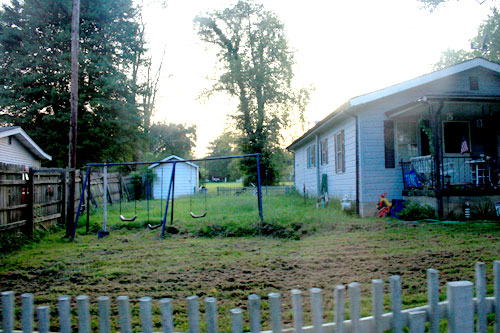
Swingset to provide a boost to children's exercise routine.
(*photo credit)
January 13, 2011
Barriers to a Physical Exercise Routine
In
the dead of winter we are often tempted to forego what virtually all health care
experts recommend for the young and the old alike, namely, daily physical
exercise (PE). Granted this is for many people the hardest month to continue
such PE routine. If none of the following affect you, then just keep going, but
encourage others who encounter one or other of these barriers. Ultimately our
physical health is at stake.
Too
far from exercise place -- Some people travel to a favorite jogging,
hiking, swimming or exercise place and thus, when weather does not favor such
adventures, the exercise is the casualty. One response is to have alternative
exercises (an indoor exercise bike or rowing machine) and this alternative or
companion exercise regime becomes predominant in inclement weather.
Too
exhausting -- This excuse is often the major one that curbs exercise when it
only intends to cut back on the amount. The experts say that the amount of PE
can be quite minimal (fifteen minutes to a half-hour each day; I strive for at
least one hour). Furthermore, the type of exercise may prove too strenuous as a
routine and an alternative may be more suited to energy levels.
Too
uninteresting -- Granted, doing the same routine over and over may prove
unappetizing to some tastes. I find that playing mental games or keeping count
in order to reach specific goals is helpful. Some people do not like to
exercise on their own, and so need companionship for encouragement; others use
television or radio to occupy their time; still others find certain routines
perfect for meditation and serious prayer.
Too
dangerous -- Bikers or joggers may have chosen too busy a street, and some
modification in route or time of exercise is necessary for safety's sake.
Too
harsh -- Certain muscles may be overly taxed or due to changing body
situations, we may have to choose a different physical exercise. When my back
gave out, I had to stop jogging and others change due to knees or hips or other
joints being unable to withstand the constant strain. Again, variety and amount
of exercise may have to be altered, and that can be for the better.
Too
embarrassing -- Some prefer not to be seen exercising; one solution is to
make the physical exercise less public.
Too
time-consuming -- This excuse is most likely the greatest temptation for
busy people who can justify removing physical exercise from the daily routine --
but maybe that is a major mistake. Again, what is all the time in a day used
for?
Prayer:
Lord, help us see that our lives must be given to a more healthy state, for
our time is limited and our outlook needs to be open and enthusiastic
through balanced physical exercise.

Remembering summer harvest.
(*photo credit)
January 14, 2011
Making Long-Range Garden Plans
In the sterile coldness of
mid-winter when outdoor activity is harder to imagine, we attempt to compensate
by preparing for spring gardening. We use pencil and paper because the snow is
too deep or the ground too frozen for the spade. In this distance from the
spring work, we could do different things: say it is not worth it; plan later
when the weather is more inviting; plan now. However, too much planning
straight-jackets future creative work in the garden. Humans plan; God laughs.
However, we do consider such plans as tentative but still worthy of some
benefit. True, overplanning may lead to disappointment -- if we are slave to
the plan. However, a few time-tested planning points are worth noting:
*
Last year's review -- Assemble data on what occurred in 2010 as to
varieties and yields, taking into account the hot summer or the amount of
rainfall during the year. Note what is worth repeating and what ought to be
modified or dropped;
*
New variety choices -- Decide on some new crops or shrubs or berries and
pick up the catalogs and move through them for ideas and varieties;
*
Seed ordering -- Look through the seed catalogs that came in over the
past few months; choose some for new varieties after reading the descriptions as
to best locations and times to plant. Just perusing photos and illustrations of
luscious fruits and vegetables can be quite uplifting in this dormant season;
*
Information exchange -- Call a gardening friend and find out what crops
were a success, and consider whether some seeds can be shared with him or her
for the coming growing year;
*
New techniques and practices -- We should all try something new each year
as to technique (extend fall gardening, or grow potatoes for the first time, or
use a new gardening device). This may mean a rearrangement or expansion of
growing areas, or it may mean taking better advantage of shaded or sunny areas;
*
Tentative design -- Refrain from getting carried away and overdesigning a
garden space. It simply will not work and will lead to disappointment in
mid-growing season. The playful approach allows us to think up new economies of
scale, numbers of plantings, sequence of growing (spring, summer and autumn
garden space) and other possibilities. In fact some designs will be followed
even though not rigidly adhered to during the season; and
*
Fresh beginnings -- Looking back to older times when "hotbeds" were more
popular, remember that this is the time to start plants in greenhouses or
protected areas. In this manner, the growing season is initiated far ahead of
time.
Prayer:
Lord, give us a sense of the season, and ready us for the work ahead through
careful planning and forethought.
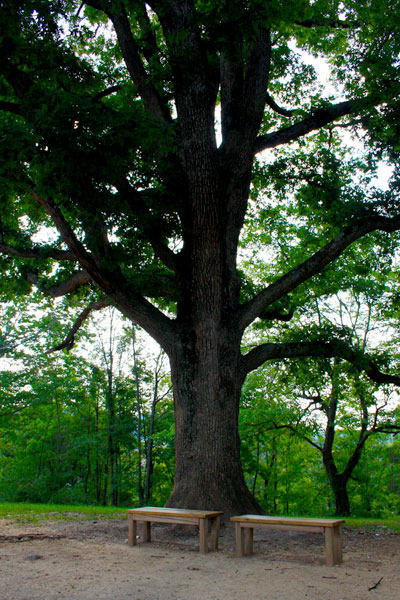
Empty seats.
(*photo credit)
January 15, 2011
Moments of Sorrow
Then they will say to the mountains, "Cover us!"
and to the hills, "Fall
on us!"
(Hosea 10:8; also Luke 23:30)
Reflection:
Our mountains
move -- yes sliding, tumbling
as fragile
cover is skimmed away,
exposing
jet-black coal, the fuel
that turns
the urban night to day.
The soil and
saplings slip downslope,
and they
can't climb back up again;
down, down to
rivers and streambeds
to smother
fish and wildlife den.
Mountain movers dig up the dead
and bury
down the living fold,
root up
graveyards and oaken groves,
erase homes
two centuries old.
All for pockets of distant wealth,
and when the
silent land calls down--
Reclaim!
Reclaim! Wager it'll be
profiteers
reaping a second round.
Will hills take
in our compassion
and forgive
all offenders' sin?
Will we cease
to make the hills fall
and start to
build them back again?
Prayer: All Merciful Lord, give us the grace of compassion for our suffering highlands,
and help us to halt the damage done to them and start the reclaiming work.
------------------
The entire passage is taken
with permission from the section entitled "Compassion" from our book Mountain
Moments, which
can be obtained from books stores
or regular Internet sites, from the publisher, Acclaim Press, or from the
photographer's family studio --
Brunner Studio 665
Big Hill Road, Berea, KY 40403
<brunnerstudio@aol.com>

Upward bound...
(*photo credit)
January 16, 2011
Vocation: Salvation Reaching Out to All
I will make you a light
to the nations, that my salvation may reach to the ends of the earth.
(Isaiah 49:6)
In
January, we review the mystery of our baptismal calling -- the great privilege
to serve God according to our station in life. The calling is a gift for
which we are eternally thankful; the calling is a sacred trust of which
we never perfectly respond; the calling is ongoing, and thus subject to
an ever-deepening commitment on the part of the recipient.
The
gift of calling makes us "graced" by God's goodness. We do not deserve
what we are to become; we are privileged to be invited to become God's people.
Our freedom shows itself in raw but simple form, for we can say "yes" or "no" in
the depths of our inner being. We can be spiritually deaf and blind -- two eyes
and two ears, but not the two divided in a responded "yes" or "no." Even when
we unfortunately say "no," in deepest gratitude we thank God for the freedom to
do so.
The
trust stands heavy upon those who flee from responsibility or who are
caught in false leads and detours of life; these allurements consume precious
time and make us deaf to the cries of the poor. "Forgive us Lord" is said when
the promises we made were not perfectly kept, and we see how golden
opportunities for betterment were not followed. The trust was mercifully given;
the failure in that trust, when seen and sincerely regretted, is given once more
in the freshness of an all-merciful God calling us.
The
deepening in our calling is an emerging reality to each of us. We have
heard but not listened, seen but not perceived, felt but not penetrated the
heart. An additional call forces us to see past limits now giving way to aging
and the sense of new responsibilities. In rare, but very real, circumstances,
we make dramatic adjustments in lifestyle and manner of acting. For some of us
comes the sudden acknowledgement that aches and pains indicate approaching
weakness and mortality. The demand for treatment or adjustment in lifestyle is
part of the ongoing nature of our call, for life is moving to new horizons.
Our
response awaits a final judgment. We answer generosity in ever growing or
faltering steps. The final judgment comes at our end -- and yet we have the
time to make the response ever better and more fulfilling. To attend to
anything is to be prepared to act to bring abut the demands of the call. We
can't just say we hear it and stop at that. We must respond in practical ways,
seeing the needs of those around us, and taking practical steps to respond as
best we can.
Prayer:
Lord, let this be my final ever-rephrased remark: "Lord, I answered you." Help
us through prayer to improve the depth of that answer, through a spiritual
maturation that sharpens our response to an ever more deepening call.

Bernheim Aboretum and Research Forest.
(*photo credit)
January 17, 2011 Work
Opportunities for Citizens
There
is no shortage of work, only the resources that allow people a livelihood while
working. New opportunities include:
*
Health and home care programs -- Health care ranging from primary medical
care through home health and physical therapy is a major issue in lower-income
rural and urban areas. Elderly and ill people in need of treatment ought to
have assistance in cooking, physical care, and travel, bestowed by individuals
who ought to receive some form of compensation for their services;
* Literacy training
programs -- A million new citizens and several million illiterate citizens
(many at older ages) are eligible for training by patient and caring people in
the English language. Computer literacy is also a growing need today and
younger people are prime recipients of this form of employment;
* School auxiliary and
special training programs -- Much additional assistance is needed in
literacy training programs, prisons, drug rehabilitation centers, health and
paralegal services, senior citizen centers, and administrative offices of
non-profit organizations: as auditors, writers, or fund-raisers;
*
Environmental experience and training programs -- First, cleanup of
damaged environments is of great necessity in fragile areas of our country.
Nature and wildlife rescue centers are in need of youthful,
environmentally-literate citizens;
*
Recreational supervision programs -- Millions of people from infants and
after-school youth to elderly day-care recipients lack support from trained and
experienced staff and needed assistants;
*
Housing programs -- Habitat for Humanity and other ongoing volunteer
services are in need of staffing in many areas;
*
Financial and citizenship advisory programs -- Quite often people
without financial expertise could get loans renegotiated at lower rates -- and
those with business expertise are key to this. Public interest advocacy for more
just economic considerations is desperately needed and could be publicly
financed;
*
Beautification and freedom garden programs -- Blighted communities are in
need of converting abandoned housing to park and greenspace. Supervisors and
organizers for gardening projects are needed in urban areas; and
*
Domestic and overseas technical programs -- Peace Corps and AmeriCorps
volunteers have been a mainstay of public service beyond our borders. A wide
variety of technical assistance groups are needed from solar cooker installers
to safe-water providers.
Prayer:
Help us, Lord, to see authentic problems and to be willing to serve others by
demanding the resources needed.
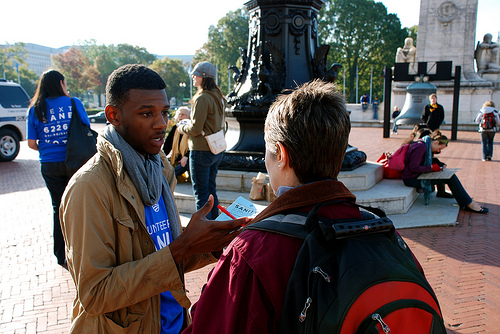
Outreach program in action.
(*photo credit: Barack Obama,
Flickr.
Creative Commons
License.)
January 18, 2011
Public Service and Student Loan Forgiveness
During this month we recall
that God calls us to be of service to others. However, those graduates who are
highly indebted are so burdened that their services are limited due to the
pressure to repay college loans. Forgiving such loans through community service
is one way out and thus this reflection differs from previous discussions on how
to avoid the debts. Currently, one outlet is service in the Peace Corps and
AmeriCorps. What more?
Broaden
the field of public service. One needs to include education and health
services in low-income and underserved urban and rural communities. The
student-turned-public-service person would need a program involving
apprenticeship under experienced direction that could be verified. Loan
forgiveness could be based on a period of service, say three or four years.
Training of various sorts may be excluded, and the pure service counted.
Church-related institutions that are primarily social welfare, heath and
education-related should be allowed within the programs. Public interest
advocacy for the good of the community should also be included.
Open
up to early job training opportunities. These programs could have the
effect of bringing services to underserved areas, with the hidden subsidy of
loan forgiveness. Advantages include a place suited to satisfying the training
program for the graduating student, while launching a chosen career. With
recent cutbacks in many service programs, the first to be rehired would normally
be the experienced, laid-off individuals, thus closing out entry by the
inexperienced new graduate.
Give
incentives to the middle aged who seek to change careers. Job opportunities
change and demand new training and career shifts. For such middle-aged people,
the burden or threat of the loans hanging over them on top of existing
responsibilities stands as a very high hurdle. New positions of service could
range from senior citizen physical education to remedial reading for migrants.
Create
a governmental agency to oversee loan forgiveness. One horrible dilemma
facing college loan programs is the emergence of for-profit "academic"
institutions, which take advantage of people seeking a higher education. When
properly operated and maintained, government oversight would encourage college
academic work and training, encourage volunteerism and public service, and allow
the student-turned-public-servant to leave after three to four years with no
debt. Some services such as health care could have comparable longer
forgiveness schedules depending on the increased debt load. Flexible debt
forgiveness scheduling must be built into the program for the benefit of our
society.
Prayer:
Help us, Lord, to see that public service is part of our citizenship, and
those who are more indebted should have this opportunity to be as debt-free as
more well-to-do students.
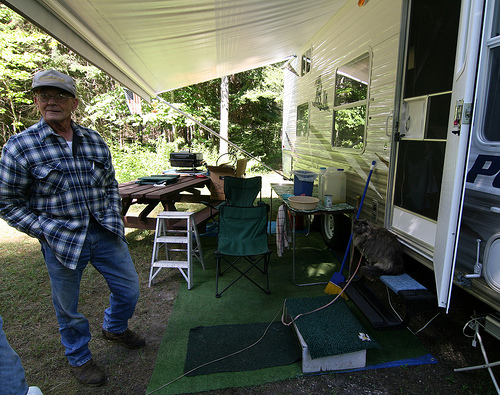
Volunteer campground host. US Forest Service, Carp River. St. Ignace, MI.
(*photo credit)
January 19, 2011 Convert
"Retirement Years" to Public Service
No
healthy and energetic person in adult and senior age should "retire," for that
is a category fraught with difficulties; retirement relegates older people to a
lesser role in our society as prized jobs are slated for the younger members of
society. In this way of thinking, the individual must exit gracefully to
retirement villages and golf courses, fishing places and tea parties.
Nonsense. People of so-called retirement age can be prime contributors to
society, for their past experience is valuable and the distracting drive for
professional ladder-climbing is no longer operative.
Senior
opportunities are galore. "Question Retirement" (see January 29, 2009 Daily
Reflections) focuses on the problem of people moving from a steady occupation or
office to a time of fun and games. Others say that such approaches are
sophomoric, selfish, and quite often life-threatening. For the ever-working,
being of good health and energy is a gift from God and the "R" word really has
to be taken with qualification. Health is such a blessing that, when we have it
at whatever age, we must use it in the service of others. If "retirement" means
halting the particular work in which one is engaged, it becomes a confusing
designation, since so many people change jobs. Today a host of early military
"retirees" are perfectly suited for further public service. They are often even
in their forties and fifties. With the gifts of health and with acquired
expertise, normally those in their sixties and beyond have possible decades of
further service.
Choices
ought to be made wisely. Often, seniors know their own limitations as to
types of work; they need to choose wisely, since some programs that could be
quite enticing to younger people are unsuited for them. When people are able to
do overseas work, they should realize their language and cultural limitations
and possible medical and dietary needs. Often, the so-called early retirees,
whether from the public or private sectors, enjoy good health and accumulated
experience and are ideal candidates to be volunteers at the service of the less
fortunate both in this country and overseas. God's call extends beyond those to
youth in life's springtime. Today, so-called "retirees" are called to hear the
prompting of the Spirit to be of service.
Senior gifts are different. Older volunteers offer gifts of wisdom,
experience, and patience -- things often in short supply in the youthful
inexperienced who are more concerned about career launching and livelihoods;
such real-life pressures are no longer on the elders. With more time to spare,
the elder can show genuine hospitality and provide opportunities for others to
talk to a receptive hearer. Elders know the community with its strengths and
weaknesses; they have connections with social networking aspects that ease a
transition into needed service areas -- a social asset.
Prayer: Lord, give us
the ability in older age to see what we can do and to offer ourselves to
be at the service of others.

Work in progress as butterfly visits flower.
(*photo by Sally Ramsdell)
January 20, 2011 Work as
Curse or Work as Privileged Opportunity
I
can almost hear the comment, "Cut the bull; who wants to work if they don't have
to?" The response comes after a slight hesitation, as though we are fighting as
contrarians in standing up for work. Yes, there is something more to serving
others than making a livelihood out of it or as an obligation to parents or
children. Service can become the expression of who we are. As Christians, we
know that Christ came to serve and not to be served.
Privileges
exist in different forms. We often get service mixed up with the goal of being
privileged enough to be served by others. How great to sit back and let others
come in and deliver a well-prepared meal or clean a room. What a luxury worth
dreaming about! Actually the American dream is confused, and part of this foggy
haze involves mixing work with slavery as has happened in the sectional
differences of our cultures. My life dwellings have straddled a South, where
work is disdained, and a Midwest, where freeholders first saw farm and
industrial work as a holy opportunity to advance. Scriptural messages were used
for both positions and so the curse and the opportunity of work clashed.
The
privileged call is one of service. The able-bodied are empowered through
the gift of health to do meaningful things in the span of a life. Opportune
work allows us to assist others in work, studies, daily chores, and a multitude
of other tasks. Even the ill who willingly and joyfully offer up their
sufferings for fellow human beings are serving. The call to do just this is a
privilege to come closer to the Lord, and thus the idea of privilege itself has
been turned on its head.
False
notions of privilege abound. Those who attacked Christianity as being at
the root cause of the environmental crisis have never been fully answered,
because too many Christians believed in exploitation, colonization, and gaining
material profits at the expense of others. Work is capitalized. Granted, the
process of exploiting takes effort, but is a false type of work, though
considered by some as the practical goal of a capitalistic economy. The entire
effort is based on false premises of personal gain. If the privilege were one of
allowing others to profit at our expense, then our reduction is their gain --
and ultimately a spiritual gain for us in the longer term.
Loving
service is a spiritual investment in future glory while the immediate goal
of helping another is foremost in our mind. Some of that future is obtained now
in the satisfaction of being of service. The kingdom is now. In other words,
love of self takes distant place to love of God and neighbor. This love is best
expressed through the multitude of ways that have been pointed out this week in
this series on public service.
Prayer:
Help us, Lord, to see the privilege that comes with seeing the good that we can
do, and give us the energy to be in service to our fellow human
beings and to Earth herself.

Resident of a horse camp near Cumberland Gap National Park.
(*photo credit)
January 21, 2011 Travel
Education and Elderhostels
Many
people had to work hard much of their lives, and in senior years have the
additional time for new public service or for leisure educational
opportunities. Certainly the road to education is haphazard at best, because
many people are not aware of what would be the best match for their own talents
and opportunities. The for-profit educational enterprises are often expensive
and uncritical of those who want to enter or advance their own careers and work
opportunities. Consider these points.
First,
all things considered, do it yourself. Self-education economizes time and
resources, provided you can see beyond existing barriers and are highly
self-motivated. Free information and advice exist for the taking. Know your
own skills and set reasonable goals through prayerful discernment. If you feel
qualified, launch out on a self-education program, but be willing to accept
advice along the way.
Second,
learn through working with others. The next best way, after self-education,
is apprenticeship to an expert; learn by the experience of being a volunteer in
a whole variety of skills and practices from house-building to gardening, some
of which are self-taught through many trial-and-error experiences. Most often,
people find that volunteering for existing organizations becomes the chance to
learn skills that can be applied later. Besides, citizen groups need help!
Third,
go back to school after careful reflection. This is not the first, but
rather the third, approach when the first two do not seem plausible. Many
people take this step first, because peer and advertising pressure are so
strong. However, this can be a loss of time, energy and financial resources.
Much depends on how serious one is in taking a career-changing path or the
studies desired at a particular time. However, educational enterprises want
your tuition payments and care little about your indebtedness.
Lastly,
consider leisure learning opportunities. All work without some play is not
a good quality of life. Domestic fulfillment includes spiritual experiences,
opportunities to study and learn second languages, and the chance to investigate
archeological, historic and natural sites. Furthermore, all people ought to
have an opportunity to travel about, visit family, find cultural roots, and make
religious pilgrimages. Fulfilling these travel opportunities requires
transportation, lodging and guide personnel who support a legitimate tourist and
education service that contributes somewhat more remotely to the public service. Mobile seniors may prefer the
popular Elderhostel non-credit programs. These senior-related programs
were started in 1975 by Marty Knowlton and immediately became popular. They
cover a wide range of subjects and have countless satisfied participants.
Prayer:
Lord, give me the inspiration to continue my education in some manner so as to
stay alert and mentally healthy.
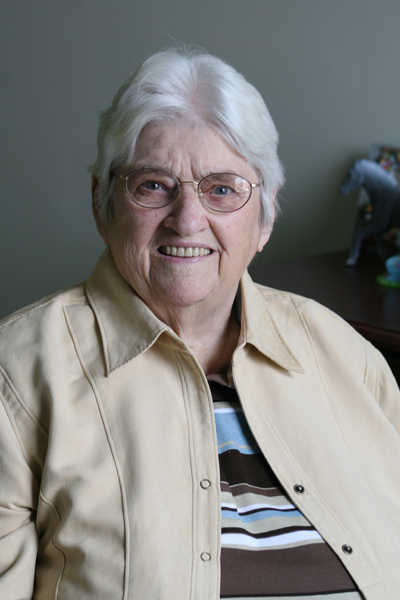
Marrietta Rapier, April 4, 1914 - December 22, 2010.
(*photo credit)
January 22, 2011 Loved
Ones Can Give Permission to Die
Appalachians and others have
a laudatory practice that involves the moments when death approaches a loved
one. They give the person permission to go ahead and die. Some might object
that only God is to take the life at a chosen time. However, the practice is
really not a taking of a life but an acceptance that we pass on, freely
acknowledging that God is in control. The dying person who fights for mortal
life now is able to freely accept mortality in its fullness. On the Cross Jesus
freely gives us the spirit; on our cross we can freely join the Lord in our
final hour.
In
my pastoral ministry, I find some people linger after the body functions start
shutting down; they have no desire to eat more food; they seem to await
permission to leave their loved ones behind on their singular journey of faith
into eternal life. They hold out to hear that it is okay to pass on; the
survivors will carry on. However, the dying experience is not uniform.
Certainly those wanting to separate themselves from a bad situation may want to
exit as painlessly and rapidly as possible and await no such permission. Others
have a certain confidence that the ones being left will be well cared for.
Others who have lived a good life do not want to burden caregivers.
We
know that on Calvary Jesus "gave up his spirit." He died in that ultimate act
of freedom having suffered and died for each of us. The free act included
living AND dying. When a middle-aged person suffers much, the loved ones still
want their eternal rest to commence immediately, and so the permission includes
the understanding that I do not want you to go but I do not want you to suffer
more either. Amid it all, I, as the permitting one, show that I am in oneness
with God's will towards you. While it is my will that you live with us here, it
is God's will that must be done -- and I am, as permitting agent, in agreement
with what God wants.
We
accept our surrender to God. The dying person receives the permission with
joy of being released by a loving community. The entire community is in
agreement that God's will is being done with a definitive finality. We
acknowledge together that God, as author of life, invites us to cooperate in
every way possible to increase our participation and quality of that life. By
living with the Lord we are also willing to die with the Lord. We are one with
the Lord and give up our spirit to enter into the totality of our offering with
the loving community that we are departing from. In love we were conceived; in
love we were nourished; in love we made decisions; and in loving relationships
we make our exit at least for a temporary parting of ways. We truly believe in
giving and accepting this permission that eternal life, together with loved
ones, awaits us.
Prayer:
Lord, teach us to let go -- to permit others to part company for a period of
time. Allow us to see that this permission is wrapped in the bonds of love and
surrender to your will.

Lycoperdon pyriforme on fallen log.
(*photo credit)
January 23, 2011
Urgent Times Demand Reformed People
Reform your lives! The
kingdom of heaven is at hand. (Matt. 4:17)
We
live in urgent times of financial crisis, of political turmoil, of seemingly
unending war, and of environmental disaster in the most likely offing. Enough
has been written and said about existing troubles to make us move on to a more
positive discussion, namely, what can we do about it. We need not be tempted
to retreat, to deny what is happening, to excuse ourselves from acting when we
do perceive the trouble, or to seek to escape to more pleasant thoughts or
activities.
What
Jesus calls for is to listen to his word and heed it. In the urgency of his
day, Jesus sets before us a call to be an observant and reformed people, who
will take up the activity needed through a joint cooperative endeavor. The
Gospel passage we hear today has a twofold aspect, Jesus proclaiming an urgent
need, and his call to his disciples to assist his mission. We too hear and seek
companions to help carry on the work that is ahead of us. In other words, the
message is not to be a lone wolf in the wilderness; we are to be an encouraging
group, a church working together as an encouraging community of believers.
The
first portion of the message involves knowing the urgency and this takes a
sensitivity to distinguish the many competing sounds that confront us at any
given time. To reform in this age means to settle down to living simply without
all the gadgets and latest fashions. We are to distance ourselves from those
who race for the best salaries and the good name and respect of the wealthy and
privileged. Down-sizing must occur for those caught in the depths of our
capitalistic culture. Giving time to reflection and caring for others must be
part of moving in the direction of self-denial, simple living, and a
conservationist ethic. Certainly, part of the lack of reform is entwined in the
urgent situation itself. Breaking away is a major step but it is only part.
The
second aspect is that we need community to encourage and enhance our commitment
to the Lord. Apart from some granted extraordinary graces of perseverance, we
the faithful majority need others to comfort us in rough times and ease our
journey to simplicity. A spirituality that is communal in nature and that looks
in gratitude to the gifts given is our goal. With time we find that by
suffering with others in these urgent times, we take on a "compassion" that is
utterly needed to make all grow in a sense of solidarity -- groundwork for a
world where we can jointly reclaim the commons that seems so far from us right
now. By responding enthusiastically we affirm the urgency of the situation
and the willingness to be party to healing our Earth.
Prayer: Lord, give us the honesty to see what must be done and the
courage to start the process, for time is short. Help us to be part of your
vocational voice leading others to take brave steps to reform their own lives
along with our own efforts.

A warm nest for shelter.
(*photo credit)
January 24, 2011
Plenty of Sleep vs. Enough Sleep?
How
much sleep do you need? I think this is the practical question that is so a
propos on these silent January days and nights when other things are not
pressing. January is the sleeping month, when nature is in the middle of its
winter rest. We ought to know our own needs and respond as well, for lack of
rest is a major malady of our society. This lack results in deterioration of
health and excess stress that can affect major and minor decisions in the
workplace and human relations. How many broken marriages and accidents have
been caused by simply not taking enough rest?
I
prefer to speak of "enough" sleep. I do not get more than about four or five
hours on an average night (9 to 10 pm until 2 am is generally sufficient) along
with an afternoon hour. That is sufficient when not under stress, for that can
cause a need for more sleep. Occasionally, I set an alarm, because after a
number of months I simply need to sleep and sleep. My mother had the same
sleepless "problem," though I told her it seemed a blessing because in my senior
years I also would not need all that sleep. For some of us, catnaps provide the
"plenty" that is needed in sleeping.
Much
depends on one's physical and psychological makeup. Some people need more sleep
and some in history (such as James Madison or John F. Kennedy) are known to have
survived on less. However, since we are not fully aware of personal
circumstances, some of the sleepless ones could have had improved social
relationships had they indulged in more sleep. Like me, they prided themselves
on less sleep -- and since my early hours of the day are the most productive
ones as far as research and writing goes, I regard the lack of sleeping time to
be a productive blessing as life gets shorter and shorter. Furthermore, those
who want and need more sleep should not generalize any more than I do. Failing
to sleep as much as they do need not be a deficiency on our part; it just may
be a blessing in the way we see it.
A
further point on sleeping, and here I express a possibly unjustified suspicion.
Do some of those who demand more sleep want to fill the day with needed
activity? Thus does their unacknowledged boredom convert into a need for extra
sleep as useful filling of the twenty-four hour span? By testifying to their
need for longer times of sleep they have less need of doing things that they
find boring or burdensome. In my way of seeing things, oversleep could actually
be unhealthy, if people should be more discerning about their limited span of
mortal time. However, between lack of sleep and oversleep is a happy medium, a
time of allowing for additional sleep when needed and less sleep when important
things press us to spring out of bed and engage in work. Here much depends on
whether one works in or needs the resting place. January is perfect to learn
about life's rest.
Prayer: Lord, allow
me to know my needs and also my excuses; permit me to sleep when sleeping and
be awake when driving, talking, reading, praying, and
working.
January 25, 2011 Oneness
within the Christian Community
We
need to be at ONE with the Lord and at one with each other. Today, this
is what the conclusion of the Church Unity Octave is all about. On this feast
of the Conversion of St. Paul we strive to realize our connectedness. Paul
understood better than others of his age that our world of Greek and Jew, male
and female, slave and free, had to come together in a unity that was absent in
the culture in which he lived. People saw others in black and white terms;
some were of unreconcilable racial, cultural and national origins; some were
economically pronounced to be privileged and others not. Paul realized that the
Good News meant we are all together in Christ for he died for all, not just for
a few.
Our
oneness is thus founded in God's will that we be one people in one world. To
make divisions and to perpetuate these divisions goes against that salvation for
ALL. Since Catholic means universal, the inclusion of others in the layers of
unity is part of our sacred mission and goal. We do not want to hinder the act
of coming together in any way. We recognize that our sinfulness has caused
disunity and has hindered the movement of the Spirit in the great act of
Pentecost overcoming the devolution caused by Babel and the division of peoples.
Being
at one in the world. On this outer layer of "oneness" we are committed to
unity among nations and people in making this a higher quality place for all to
live in peace and prosperity. Our goal is to eliminate hunger and want in all
its forms or else, instead of oneness, we will have terroristic separation.
Here at this level we join with all people of good will, especially those who
live righteous lives and believe in God's mercy and goodness.
Being
at one among Christians. On a more intimate level of love we seek to join
forces with other Christians who speak up for the freedom of all peoples and who
strive to work together to allow a decent life. Here church communities need to
work together in our collective journey of faith. We become one with others in
a very special bond of Baptism and wish them well, not knocking their beliefs or
efforts, but striving to enhance their own ministry especially with youth,
elders, the sick and the disadvantaged. We wish them well; we pray for them;
we bless them in what they do.
Being
at one within our Church. We need to see this unity as something that our
community seeks to bond us all the more closely in troubled times. Thus we pray
for and come more deeply to a commitment to each other within our faith
community. We think with the Church; we strive to make it one with others; we
have a deep sympathy with the leaders of our Church and their great struggles to
keep discipline and to grow in mutual understanding and respect for each other.
We need to love the efforts of others and to bless them in what they strive so
earnestly to achieve.
Prayers:
Lord, teach us to be at one, as Christ is with us, and we are called to be with each
other.
January 26, 2011
Winter's Moments of Gratitude
As we advance in age, harsh
weather, whether in the heat of summer or the cold of winter, seems harder to
endure. Thus we may be tempted to grumble about heat or cold and how these
extremes reduce our mobility, make us prone to illness, or just seem too
unpleasant. However, winter has advantages worth considering:
* Winter's silence
gives us moments to stop and reflect on the calling God has given us in very
special ways;
* Winter's crispness
sharpens our powers to use the resources at hand far more wisely and
efficiently;
*
Winter's new snow allows us to see that imperfections can be covered over
in mercy, and blemished life can have a fresh start;
*
Winter's inclement moments can keep us immobile for a time, and thus help
us to avoid the busyness of everyday life;
*
Winter's difference from summer enables us to appreciate each season in
its own turn;
*
Winter's darkness affords periods for profound rest;
*
Winter's wildlife makes us aware that others depend on our largess in
order to stay alive;
*
Winter's stirring, while ever so faint, makes us strain to find new
reasons for hope for a springtime that seems so distant;
*
Winter's nakedness manifests the forms of trees and landscape and the
human artifacts that punctuate the countryside;
*
Winter's moonlit nights give us a sense of enchantment at our sister the
moon, and its gentle way of enlightening us;
*
Winter's warm food and drink comfort the uncomfortable and spark renewed
gratitude for having a contented belly;
*
Winter's fewer sounds tune us in to nature's call from the owl, the
coyote, and the snow that crunches as we walk on the frozen earth;
*
Winter's time invites us to use things wisely, for flowers will soon be
here, and yet we are challenged to continue our more burdensome physical
exercises; and
*
Winter's very harshness affords us opportunities to encourage others who
find the season hard to endure.
Prayer:
Lord, when thanksgiving seems harder to make, give us the added inspiration
to look into deeper gifts so often hidden from our eyes. Help us see the
mini-miracles of life.
January 27, 2011 Language
Revitalization and the Commons
Through
past Daily Reflections we have discussed the possible demise of half the world's
six to seven thousand languages in this century. These disappear at a rate of
one every two weeks, and the picture is bleak. Hundreds of tongues have reached
levels of tens or hundreds of speakers, and often very old people. However, the
picture does have some glimmers of hope, as people identify the most endangered
languages and record songs, tales, and dictionaries for an effort in retaining
these treasures.
Furthermore David Harrison in
a new book, The Last Tongues, mentions some areas where youth within the
culture have taken it on themselves to sing, rap, and speak the endangered
language of their native village or region. When these speakers see a value in
retaining a tongue that is being threatened by a major language in their area,
they make an effort to learn to speak it well from elders, and thus they grow in
respect for their cultural heritage. Professor Harrison is convinced that if
the young are able to learn and retain the language, they can pass on this
unique heritage that includes personal stories, creation myths, songs, native
medicines and many other aspects of valuable folklore that are not easily or
possibly fully translatable to a predominant tongue.
Language
revitalization is promising and can be done provided the language is not at
death's door with the very last speakers aged residents unable to pass on a
tradition to interested younger members. Much depends on the critical span of
time and younger people; if they are interested, then the language will
survive; if they do not show interest in what the elders say and do, then all
of a valuable language, like an exotic plant or threatened animal, is lost
forever. It is not enough to simply record the remnant speakers; vitality
calls for carrying on that vital cultural force to another generation.
Threatened
languages require the same effort and resources as do threatened flora and fauna
species. First, the threat must be discovered and identified. Next, those who
work with such threats must enter into the cultural area and interest younger
people to take up the issue. Third, the efforts at preserving must be
publicized and rewarded to some degree. Governments must take pride in these
treasures in their midst and make the efforts known to a wider world. By giving
a sense of worth to the speakers and creating a series of exercises, educational
programs, cultural events and other innovative activities, the picture could be
change quite drastically. Young people learn faster and can find and exude
pride especially when their efforts are rewarded. Last of all, an international
effort must be made to save this precious commons' resource.
Prayer:
Lord, teach us to love the cultural diversity of our world, and to see this as
an enrichment worthy of support, especially for those who wish to foster their
threatened native languages.
January 28, 2011
Capitalism Fosters Lack of Faith
The title of this Daily
Reflection may disturb confirmed capitalists who regard their supernatural faith
as enwrapped within the current economic system. Perhaps those folks might give
some extra thought to what is involved in a system where a thousand billionaires
live on a planet with one billion people who do not have enough to eat. Poverty
is immoral; to permit poverty in a democratic society damages the democratic
process and weakens our ability to have faith (albeit a mixture of supernatural
and natural faith) that we can make a difference.
When
we are submerged in daily and hourly Wall Street reports and the day-to-day
accounts of economic progress or its lack, we may question the faith that we can
make a difference. We think we are just part of a system, and others will laugh
at our radicalism or idealism -- or both -- if we even question capitalistic
ways of doing things. However, let's look at the inverse. To fail to question
the system is taking a partisan position, a stance that we cannot make a
difference, and that our cry in the wilderness will go unheeded. To hold this
sense of powerlessness is to lack faith.
On
the contrary, every voice raised gives another person the encouragement to raise
his or her voice questioning this immoral and perverse system. Here we can take
a stand that each citizen can make a difference and that our political influence
can become contagious -- if we but continue to act publicly. A capitalism that
accepts accumulated wealth as the linchpin of progress demands the acceptance by
the public of its accumulation of wealth. It also demands that we do not have
the faith that things can be changed for the better. The system works on lack
of faith on the part of the body politic. Some who do not believe they can
change the system will either look to leaders to tweak the system, or try to
encourage a volunteerism that mitigates the system's abuses.
We
need faith that we can move mountains as Jesus says. With faith the system can
be changed, and it is up to us to initiate the change; we are the catalyst, the
points of change that can accelerate the process that must be needed to confront
and overcome the disparity of wealth. We need to call for fair taxes, the
simple and most democratic means of equalizing the wealth of the world. These
taxes are meant for the good of all the people -- not the wealthiest. The
possibility of placing tax burdens equally on the wealthy does not decrease the
resources of our world, but allows for the spread of these to those seeking
improved agriculture and better health and lodging conditions. Our faith is
that WE can make a difference, that we can change the system to a fairer and
just one. We can do it if we believe that we can make a difference. While each
must affirm this as an individual, the sooner we affirm this in community the
faster change can occur in this troubled world.
Prayer:
Lord, teach us the power that resides within us, the power to do good and improve the
lot of people through our action.
January 29, 2010
Dying as Opportunity to Spread Good News
Most people prefer to avoid
discussions of dying for such are not pleasant topics. However, we can make the
most of any circumstance and, since we are certainly going to be involved in
dying in the indefinite future, it is appropriate to see this as part of our
personal calling. The challenge is to make this most personal of issues a
beneficial social event -- without it being a public execution as
entertainment. Sudden deaths either by accident or warfare hardly count here,
for the great majority of people have some breathing time from the moment death
is imminent. This more common dying situation is highly likely for ourselves
and loved ones, and thus some points are worth reflection.
Remote
preparation is a teaching opportunity. Often people in full use of their
mental faculties can prepare for death as a natural occurrence. Our financial
and other preparations are good indicators that we take the natural in stride
and affirm our participation in a singular and yet shared human event. Dying is
not to be denied but is coming inevitably. None of us is experienced at this preparation,
for we need help to select funeral songs or burial places or final rites. All
of these affairs have a finality that tells others we are prepared to move on to
eternal life. Remote preparation is a good teaching device.
Proximate preparation is
an additional golden opportunity. First, people who die a happy death give
vast comfort to those loved ones left behind. They show that the Kingdom of
God is already beginning here and now. To go with a satisfaction that the
passing is an accomplishment is a good thing -- a happy death. Those who stand
near realize that their presence even in their utter helplessness is important
-- a testimony that God is really in control. When formal expressions of prayer
are given, the comfort of the dying one is extended to those praying nearby.
When a Litany of Thanksgiving is said by those present, something special
occurs, for the mercy of God comes in our praise of the Divine Will now
manifested in a special way by a natural death.
Immediate
preparation is more problematic. Our wish is to die in style, and not in
utter agony. Here we trust in the mercy of our Creator. None of us is sure of
that final moment, and so we do the best by knowing it will come and accept who
we are. Those saying the "Hail Mary" with devotion will be assured a happy
death -- and I have never seen it fail. The greatest immediate preparation is a
good remote one. Expect that this most precious moment of life will come with a
world closing in around us, and we experience our powerlessness and dependence
on God. Remembrance of past faults, even forgiven ones, still cloud the
memories of some. Assurance of God's mercy by those near at hand will make the
passing a truly satisfying one. In other words, those attending the dying
person create and enhance the total teaching opportunity.
Prayer:
Help us, Lord, to make preparation for the time of dying that comes to all --
and to writer and reader as well.
January 30, 2011
Beatitudes and Blessings
He
began to teach them saying: Blessed are...(Matthew 5:1-12)
Jesus gives to us through
the Beatitudes a summary of all his teachings and examples -- and the list is a
portrait of who he is. Jesus is the Divine blessing, and he invites us to
follow his example. Thus we look forward to giving blessings on every occasion
possible. These blessings and beatitudes refer to happiness. We seek a peace
of soul and manifest such in distributing blessings, where others would say no
peace could be found. Being like Christ means that we seek to find every
opportunity for giving blessings to a troubled world. Jesus makes everyday life
an occasion for beatitude and invites us to follow his example:
* Jesus addresses the
poor in spirit directly and seeks to bring them within the arena of his
ongoing love; so ought we, for we need enrichment in spirit and the courage to
enrich others;
*
Jesus comforts those who mourn (e.g., the widow with the dead son). We
ought to approach those who bear the sadness of loss of loved ones and need our
consoling words;
*
Jesus gives special attention to the meek (e.g., Barthimeus). We observe
many who are afraid to act boldly and we encourage them to stand up for their
rights;
*
Jesus uplifts the downtrodden, those hungry and thirsty for justice. We
must speak for the righteous at every opportunity;
*
Jesus shows solidarity to the merciful. We too ought to give a sense of
mercy to all who are looking for forgiveness;
*
Jesus blesses the clean of heart. We must look out for the quiet
overlooked ones with clean hearts and uplift them;
* Jesus joins with
peacemakers of all ages who want to reduce strife. We must enter into that
peaceable company.
* Jesus is aware of those
who are persecuted and is at one with them. We unite with him in our
awareness and exposure of the victims' plight, so they can be allowed to live in
peace.
We seek opportunities to
give a multitude of blessings --
* to those who bring Christ
to the homes of shut-ins;
* on occasions of
celebrating special liturgical events (e.g., St. Blaise's Day blessing
throats);
* among our family and
friends before meals;
* for homes where the very
young are frightened of darkness, or members suffer from some form of abuse; and
* for travelers as they
prepare to go on a long journey.
Prayer:
Lord, help us to magnify your beatitudes.
January 31, 2011
Seeking a Title for Reclaimers of the Commons
We like categories,
groups, parties, allegiances, and other gatherings of the like-minded, as do
those of us who want to reclaim the commons for all people. No special title
of more than one word is satisfactory, and so Reclaimers of the Commons
hardly suffices for popularists. Neither does "commons do-gooders" make much
sense and even conveys a volunteerism that seems the opposite of what is
intended. Titles have to be snappy and yet precise and directly related to what
is desired in "entitlement."
Reclaimers
is not exclusive. A reclaimer could be someone who is reclaiming land that is
damaged by erosion, salination or deforestation; it could be a person who is
reclaiming title to property that was removed by just or unjust causes; it
could be someone who takes back a privilege that has been wrested away through
outside causes. However, those who reclaim the commons do the same activity
performed by other reclaimers, and so the title is proper even if not exclusive.
Communists
has some of the hallmarks of a commons for the people, but a sorry history of
the twentieth century makes this a burdened legacy of Stalinism, Castroism and
Maoism that will be hard to bury for those who have suffered through the
communism/statism that suppressed individual freedom, religious expression and
personal property rights. Had that history not occurred, the communism of the
early Church as found in the "Acts of the Apostles" would be a propos.
The operative principle, "to each according to need," makes sense. But why
burden reclaiming the commons with a title that only adds pain, burdens, and
political negatives -- for few realize the Biblical roots of this political
system? Many who champion the Good Book wrap themselves in the banners of
Godless (not godless, for money is idolized) capitalism. Disentangling
can be very difficult.
Commoners
is certainly not perfect as a title either; while precise it lacks the virtue of
snappiness; it does contain a particularly humble and simple note, for it
recalls the lower of the three estates of France or the alternative to the House
of Lords (nobles and clergy) of England. We are all part of the commons and so
this becomes inclusive, even when we partly acknowledge that an implicit
nobility of wealth still exists in our midst. I prefer this as a temporary
title, for it is precisely what is intended. In accepting this title we
acknowledge that currently our country -- and world -- are dominated by the
privileged wealthy who decide policy and how their wealth is being expended. Our
hope is that this form of undemocratic nobility is temporary. Some can attain
this through creative genius, inheritance or purely good luck. However, we do
not have to accept its class legitimacy or its immoral growing inequality. All
things considered, what do you suggest as a better title?
Prayer:
Lord, allow us to work for a better understanding of how to spread the Good News
in all its expressions and nuances.
|